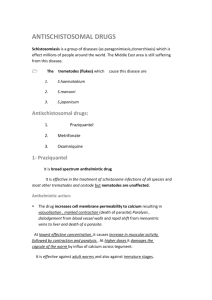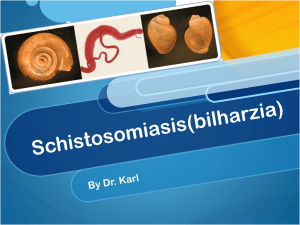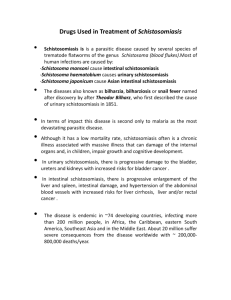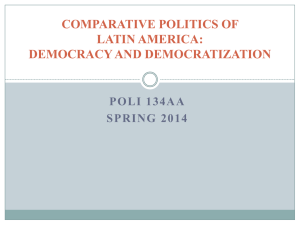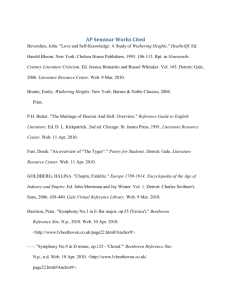SCHISTOSOMIASIS - Course Websites
advertisement
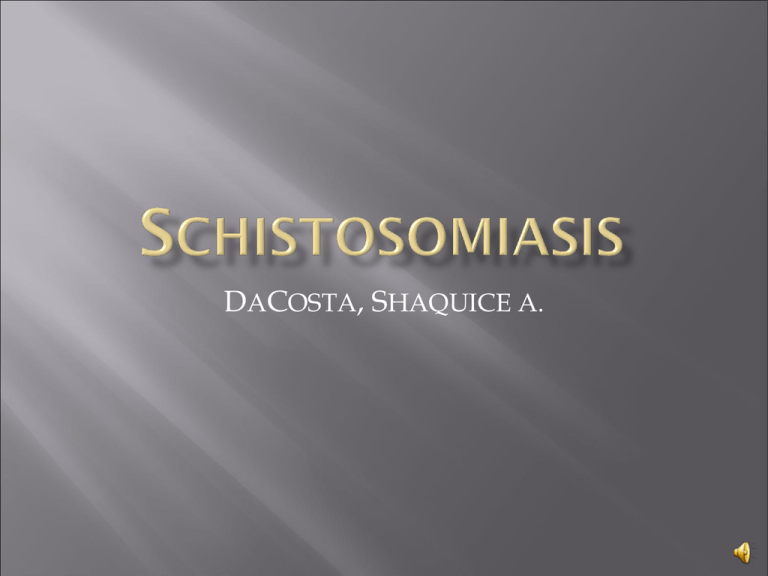
DACOSTA, SHAQUICE A. Once known as bilharzia. It was named after Theodor Maximilian Bilharz. 1st to describe the ailment in men in 1851 at the Kasr-elAini in Cairo, Egypt. Schistosome eggs were found in ancient Chinese and Egyptian mummies by Sir Armand Ruffer in 1910 (SRG). S. haematobium, first species to be discovered. S. japonicum, named by Fijiro Katsurada, Professor of Medicine at Okayama Medical School. S. mansoni, discovered in 1907. S. mekongi, officially named in 1978. S. intercalatum, officially named in 1934. Intestinal S. Urogenital S. Species Geographical distribution S. mansoni Africa, Middle East, Caribbean, Brazil, Venezuela, Suriname S. japonicum China, Indonesia, Philippines S. mekongi Cambodia, Lao S. intercalatum Rainforests of central Africa S. haematobium Africa, Middle East Mainly anyone in contact/sustained with infested waters. ie. Farmers, women washing clothes, and children Caused by body’s reaction to the worms’ eggs, not the worms. Symptoms: Abdominal pain Hematuria Fibrosis of the bladder and ureter Vaginal bleeding infertility Diagnosed by finding the parasite eggs in stool or urine samples. Filtration using nylon, paper, or other special filters are used Staining the fecal or urine samples are also used Larva will burrow into human host’s skin Then, go on to live in the blood vessels and mate and deposit thousands/millions of eggs Praziquantel It is effective, safe and low-cost. Re-infection may occur after treatment, the risk of developing severe disease is diminished and even reversed when treatment is initiated in childhood. [prazz-ih-KWAN-tull] Comes in forms for human and for fish tanks/ponds (3) Table: Parasite Species and Geographical Distribution of Schistosomiasis. Photograph. The World Health Organization. The World Health Organization. 2010. Web. 20 Apr. 2010. (4) Global Distribution of Schistosomiasis. 1993. Photograph. The World Health Organization. The World Health Organization. 1993. Web. 20 Apr. 2010. (6) Wetzel, Bruce. Schistosome Parasite. Photograph. National Cancer Institute. Wikipedia. 01 Jan. 2001. Web. 20 Apr. 2010. ***(6) Schistosome Life Cycle Animation. The Wellcome Trust. Web. 20 Apr. 2010. <http://www.wellcome.ac.uk/en/labnotes5/animation_popups/schisto.html>. (7) Temple, Bliss. "Schistosoma haematobium (blood flukes)". Stanford University. 28 March 2010 <http://www.stanford.edu/class/humbio103/ParaSites2004/Schisto/website.html>. (8) MatTodd. Praziquantel. Photograph. The Synaptic Leap. The Synaptic Leap. 01 Jan. 2006. Web. 20 Apr. 2010.
